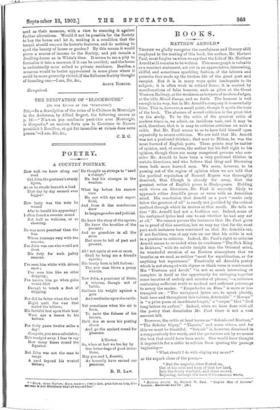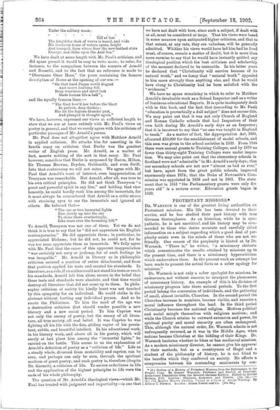B 0 0 KS.
MATTHEW ARNOLD.* THOUGH we gladly recognise the carefulness and literary skill employed in the making of this book, the author, Mr. Herbert Paul, must forgive us when we say that the Life of Mr. Matthew Arnold still remains to be written. This monograph is valuable as a succinct statement, set out in an appreciative, interesting, skilful, and sometimes sparkling fashion, of the labours and pursuits that made up the tireless life of the great poet and essayist But it is in many ways quite inadequate to its subject ; it is often weak in critical force ; it is marred by manifestations of false humour, such as gibes at the Great Western Railway, at the weakness as lawyers of modern Judges, at the title Mixed Essays, and so forth. The humour is well enough in its way, but in Mr. Arnold's company it is essentially false. This is, however, a small point, though it spoils the tone of the book. The absence of sound criticism is the great blot on the study. To be the critic of the greatest critic of modern times is, we admit, an invidious task, and it may be
said, therefore, that it is easy to criticise criticism on such a critic. But Mr. Paul seems to us to have laid himself open
repeatedly to severe criticism. We are told that Mr. Arnold was not a profound thinker ; that next to Milton, he was the most learned of English poets. These points may be matter of opinion, and, of course, the author has his full right to his opinion, though there are many competent persons who con. eider Mr. Arnold to have been a very profound thinker in certain directions, and who believe that Gray and Browning were both more learned men. We seem, however, to be passing out of the region of opinion when we are told that the poetical reputation of Samuel Rogers was thoroughly deserved, that Clough is already far away, that the greatest writer of English prose is Shakespeare. Holding such views on literature, Mr. Paul is scarcely likely to approach either Arnold's prose or verse with an Arnoldian mind. His conclusion that Arnold as a poet "ranks only below the greatest of all" is surely not justified by the critical method through which he arrives at that result. He tells us that "Mr. Arnold had not a faultless ear. Indeed, some of his unrhymed lyrics lead one to ask whether he had any ear at all." We cannot pursue the instances that Mr. Paul gives us in proof of this assertion, but we may say that for the most part such instances have convinced us that Mr. Arnold's ear, if not faultless, was at any rate an ear that his critic is not in a position to criticise. Indeed, Mr. Paul's right to criticise Arnold seems to us ended when he condemns "The Sick King in Bokbara," with its subtle insight into the Oriental mind, its wonderful creation of an Eastern atmosphere that we breathe as we read, as neither "meet for republication, or for anything but repentance." Practically all Arnold's poetry which is not stamped with rhyme or blank verse is condemned. His "Tristram and Iseult" "is not so much interesting or complete in itself as the opportunity for stringing together some beauties of melody and niceties of phrase,"—a criticism containing sufficient truth to mislead and sufficient patronage to annoy the reader. " Empedocles on Etna" is more or less trampled On: "The unrhymed lyrics are, to speak plainly, both here and throughout this volume, detestable." " Merope " is "a prize poem of inordinate length," a "corpse" that "died long before its author." Indeed, when we have done with all the poetry that dissatisfies Mr. Paul there is not a vast amount left.
However, the critic at least leaves us " Sohrab and Rustum," "The Scholar Gipsy," " Thyrsis," and some others, and for this we must be thankful. " Sohrab" is, however, dismissed in a comparatively few words, and the quotations are by no means the best that could have been made. One would have thought it impossible for a critic to refrain from quoting the passage beginning- " What should I do with slaying any more ? "
or the superb close of the poem,—
" But the majestic river floated on, Out of the mist and bum of that low land, Into the frosty starlight, and there moved, Rejoicing, through the husli'd Choriunnian waste,
• Matthew Arnold. By Herbert W. Paul. "English Mon of Letters." London s Macmillan and Co. Pe.] Under the solitary moon ; Till at last The loned-for dash of waves is heard, and wide His luminous home of waters opens, bright And tranquil, from whose floor the new-bathed stars Emerge, and shine upon the Aral Sea."
We have dealt at some length with Mr. Paul's criticism, and did space permit it would be easy to write more ; to refer, for instance, to the comparison between the sonnets of Arnold and Rossetti, and to the fact that no reference is made to " Obermann Once More," the poem containing the famous description of Rome at the opening of our era :— "On that hard Pagan world disgust And secret loathing fell. Deep weariness and sated lust Made human life a hell"; and the equally famous lines :— " The East bow'd low before the blast In patient, deep disdain ; She let the legions thunder past, And plunged in thought again."
We have, however, expressed our views at sufficient length to show that we are at issue entirely with Mr. Paul's views on poetry in general, and that we rarely agree with his criticism of particular passages of Mr. Arnold's poems.
Mr. Paul does not altogether agree with Matthew Arnold in applied criticism. He attacks him for asserting in the fourth essay on criticism that Burke was the greatest writer of English prose. Mr. Arnold, as a matter of fact, asserts nothing of the sort in that essay. Mr. Paul however, considers that Burke is surpassed by Bacon, Milton, Sir Thomas Browne, Dryden, Goldsmith, and even Swift. Into that controversy we will not enter. We agree with Mr. Paul that Arnold's want of interest, even inappreciation, of Tennyson was remarkable. But Arnold, after all, was true to his own critical principles. He did not think Tennyson "a great and powerful spirit in any line," and holding that view honestly, he could hardly rank him among the immortals, for it must always be remembered that Arnold as a critic strove with straining eyes to see the immortals and ignored all others. He believed that.—
"The one or two immortal lights Rise slowly up into the sky To shine there everlastingly, Like stars over the bounding hill."
To Arnold, Tennyson was not one of these. Yet we do not think it is true to say that he "did not appreciate his English contemporaries." He did appreciate them ; in particular, he appreciated Dickens ; but he did not, he could not, for he was too near, appreciate them as immortals. We fully agree with Mr. Paul that the cause of this apparent inappreciation "was certainly not envy or jealousy, for of such feelings he was incapable." Mr. Arnold in literary as in philosophic criticism secured a position of entire detachment, and from that position applied his tests and created his standards. In literature, as a rule, if an author could not stand his tests or reach his standards, Arnold left him alone, secure in the belief that these tests and standards were absolute, and that time would destroy all literature that did not come up to them. In philo- sophic criticism of society his kindly heart was not touched by this sympathy for an individual. He could strike in the abstract without hurting any individual person. And so he smote the Philistines. To him the need of the age was a destructive criticism that should render possible a new literary and a new social period. To him Caprice was not only the enemy of poetry, but the enemy of all litera- ture, all true society, all real belief. It was Caprice he was fighting all his life with the fine, gliding rapier of his persis- tent, subtle, and beautiful intellect. In his educational work, in his literary work, and above all in his poetry, which will surely at last place him among the "immortal lights," he carried on the battle. This seems to us the explanation of Arnold's definition of poetry as a "criticism of life." Life as a steady whole, divorced from mutability and caprice, can be seen, and perhaps can only be seen, through the spiritual medium of great poetry; and such poetry is, therefore (despite Dr. Garnett), a criticism of life. To secure orderliness in life and the application of the highest principles to life were the ends of his whole philosophy.
The question of Mr. Arnold's theological views—which Mr. Paul has treated with judgment and impartiality—is one that we have not dealt with here, since such a subject, if dealt with at all, must be considered at large. That his views were based
in some measure upon antiquated higher criticism, and that to that extent, at any rate, they are valueless, will be generally admitted. Whither his views would have led him had he lived must, of course, remain a matter of doubt, but it is more than mere surmise to say that he would have instantly quitted any theological position which the best criticism and scholarship of the moment declared to be untenable. In his latter years he declared that "Christianity will survive because of its natural truth," and we fancy that "natural truth" appealed to him more strongly than anything else, and that he would have clang to Christianity had he been satisfied with the "evidences."
We have no space remaining in which to refer to Matthew Arnold's invaluable work as a School Inspector and as a writer of luminous educational Reports. It is quite inadequately dealt with in this book, and the fact that (according to Mr. Paul) "education is proverbially a dull subject" does not excuse this. We may point out that it was not only Church of England and Roman Catholic schools that had Inspectors of their own faith during Mr. Arnold's early days as an Inspector; that it is incorrect to say that "no one was taught in England to teach." As a matter of fact, the Appropriation Act, 1834, allocated £10,000 for the establishment of model schools, and this sum was given to the school societies in 1839. From 1844 there were annual grants to Training Colleges, and by 1870 no fewer than thirty-eight Training Colleges were under inspec- tion. We may also point out that the elementary schools in Scotland were not" admirable "in Mr. Arnold's early days ; that our secondary schools are not now "almost as bad as ever," but have, apart from the gfeat public schools, improved enormously since 1874; that the Duke of Newcastle's Corn. mission was appointed in 1858 and not in 1861. The state. ment that in 1851 "the Parliamentary grants were only fivE years old" is a serious error. Education grants began in 1833.







































 Previous page
Previous page